Related Research Articles
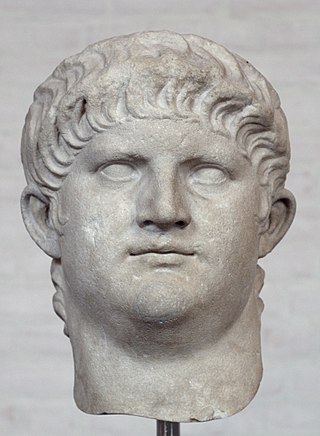
Nero Claudius Caesar Augustus Germanicus, was the fifth Roman emperor and final emperor of the Julio-Claudian dynasty, reigning from AD 54 until his death in AD 68. He was adopted by the Roman emperor Claudius at the age of 13 and succeeded him on the throne. Nero was popular with the members of his Praetorian Guard and lower-class commoners in Rome and its provinces, but he was deeply resented by the Roman aristocracy. Most contemporary sources describe him as tyrannical, self-indulgent, and debauched. After being declared a public enemy by the Roman Senate, he committed suicide at age 30.

The 50s decade ran from January 1, 50, to December 31, 59. It was the sixth decade in the Anno Domini/Common Era, if the nine-year period from 1 AD to 9 AD is considered as a "decade".
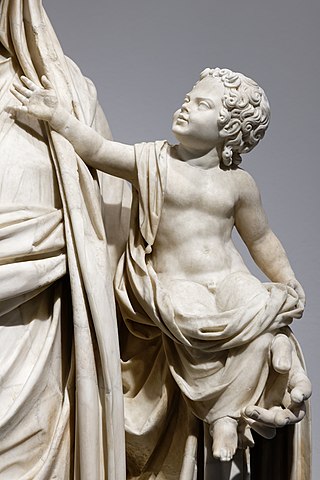
Tiberius Claudius Caesar Britannicus, usually called Britannicus, was the son of Roman Emperor Claudius and his third wife, Valeria Messalina. For a time, he was considered his father's heir, but that changed after his mother's downfall in 48, when it was revealed she had engaged in a bigamous marriage without Claudius' knowledge. The next year, his father married Agrippina the Younger, Claudius' fourth and final marriage. Their marriage was followed by the adoption of Agrippina's son, Lucius Domitius, whose name became Nero as a result. His stepbrother would later be married to Britannicus' sister Octavia and soon eclipsed him as Claudius' heir. After his father's death in October 54, Nero became emperor. The sudden death of Britannicus shortly before his fourteenth birthday is reported by all extant sources as being the result of poisoning on Nero's orders; as Claudius' biological son, he represented a threat to Nero's claim to the throne.
Ofonius Tigellinus (c. 10 – 69) was a prefect of the Roman imperial bodyguard, known as the Praetorian Guard, from 62 until 68, during the reign of emperor Nero. Tigellinus gained imperial favour through his acquaintance with Nero's mother Agrippina the Younger, and was appointed prefect upon the death of his predecessor Sextus Afranius Burrus, a position Tigellinus held first with Faenius Rufus and then Nymphidius Sabinus.
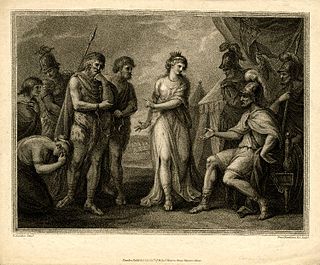
Cartimandua or Cartismandua was a 1st-century queen of the Brigantes, a Celtic people living in what is now northern England. She came to power around the time of the Roman conquest of Britain, and formed a large tribal agglomeration that became loyal to Rome. The only account of her is by the Roman historian Tacitus, through which she appears to have been widely influential in early Roman Britain.
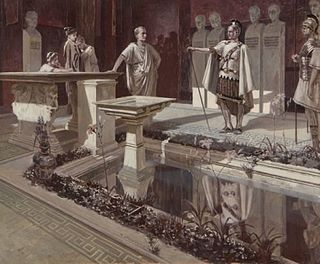
Aulus Plautius was a Roman politician and general of the mid-1st century. He began the Roman conquest of Britain in 43, and became the first governor of the new province, serving from 43 to 46 CE.

Publius Clodius Thrasea Paetus, Roman senator, who lived in the 1st century AD. Notable for his principled opposition to the emperor Nero and his interest in Stoicism, he was the husband of Arria, who was the daughter of A. Caecina Paetus and the elder Arria, father-in-law of Helvidius Priscus, and a friend and relative by marriage of the poet Persius. Thrasea was the most prominent member of the political faction known today as the Stoic Opposition.
Quintus Marcius Barea Soranus was a Roman senator who lived in the reign of Nero. He was suffect consul in 52, but later attracted the hatred of Nero, and upon being condemned to death committed suicide. He was associated with a group of Stoics opposed to the perceived tyranny and autocratic tendencies of certain emperors, known today as the Stoic Opposition.
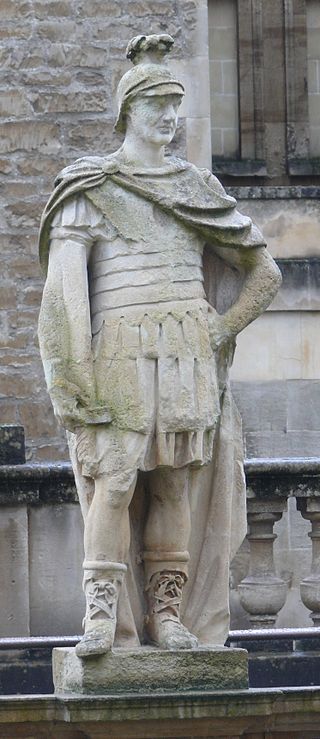
Publius Ostorius Scapula was a Roman statesman and general who governed Britain from 47 until his death, and was responsible for the defeat and capture of Caratacus.

Nero Julius Caesar was the adopted grandson and heir of the Roman Emperor Tiberius, alongside his brother Drusus. Born into the prominent Julio-Claudian dynasty, Nero was the son of Tiberius' general and heir, Germanicus. After the deaths of his father and of Tiberius' son, Drusus the Younger, Nero and his brother Drusus were adopted together by Tiberius in September AD 23. As a result of being heirs of the emperor, he and his brother enjoyed accelerated political careers.
The final battle in Caratacus's resistance to Roman rule was fought in 50 AD. The Romans under Publius Ostorius Scapula defeated the Britons and in the aftermath captured Caratacus himself, since 43 the leader of armed opposition to the Roman conquest of Britain. He was paraded through Rome and given the opportunity to make a speech before the emperor Claudius, who spared his life and those of his family and retainers.
Gaius Sallustius Passienus Crispus was a prominent figure in the Roman Empire during the first century. He held the consulship twice, and was stepfather of the future emperor Nero.
Lucius Arruntius Camillus Scribonianus was a Roman senator, who was active during the reign of Tiberius. He was consul in AD 32. Ten years later, he revolted against the emperor Claudius, but was swiftly defeated.
The Roman–Parthian War of 58–63 or the War of the Armenian Succession was fought between the Roman Empire and the Parthian Empire over control of Armenia, a vital buffer state between the two realms. Armenia had been a Roman client state since the days of Emperor Augustus, but in 52/53, the Parthians succeeded in installing their own candidate, Tiridates, on the Armenian throne.
Cossutianus Capito was a Roman senator and delator, often acting on behalf of the contemporary Roman emperor during the Principate. Tacitus offers a hostile portrait of Capito in his Annales, describing him as a "man stained with much wickedness", and as having "a heart eager for the worst wickedness".
Publius Suillius Rufus was a Roman senator who was active during the Principate. He was notorious for his prosecutions during the reign of Claudius; and he was the husband of the step-daughter of Ovid. Rufus was suffect consul in the nundinium of November-December 41 as the colleague of Quintus Ostorius Scapula.
Publius Rufus Anteius was a politician of ancient Rome of the 1st century CE.
The gens Ostoria, occasionally written Hostoria, was a plebeian family at Rome. Members of this gens are first mentioned in the early years of the Empire. Although only a few of them achieved any prominence in the Roman state, many others are known from inscriptions. The most illustrious of the Ostorii was probably Publius Ostorius Scapula, who was consul during the reign of Claudius, and afterward governor of Britain.
Gaius Manlius Valens was a Roman senator of the late first century AD. He was selected as consul ordinarius in his ninetieth year, serving with Gaius Antistius Vetus in AD 96.

Lucius Calpurnius Piso was a Roman senator active in the first century AD. During the Year of Four Emperors he was governor of Africa and supported Vitellius. After the death of Vitellius he was killed by supporters of Vespasian.
References
- ↑ Paul A. Gallivan, "Some Comments on the Fasti for the Reign of Nero", Classical Quarterly , 24 (1974), p.
- 1 2 Tacitus, Annales , XII.31
- ↑ Tacitus, Annales, XIV.42
- ↑ Tacitus, Annales, XVI.14f